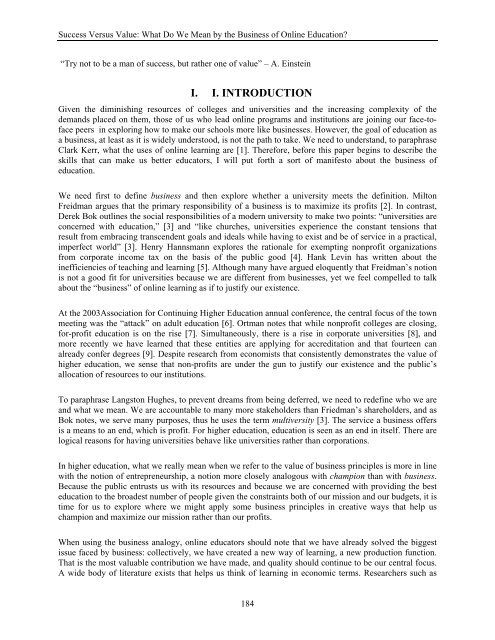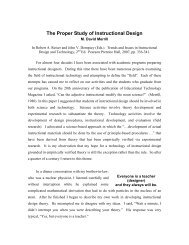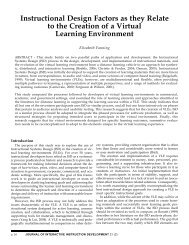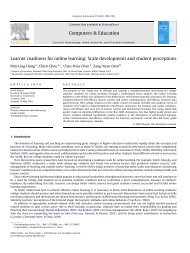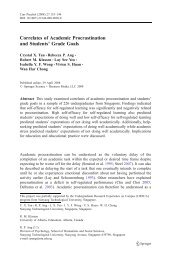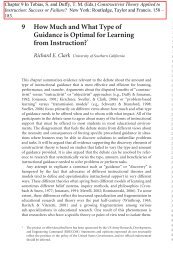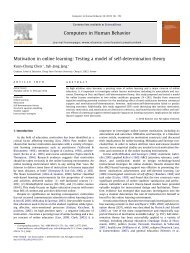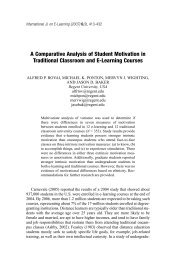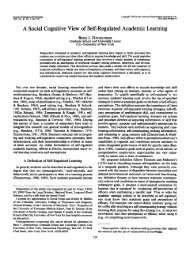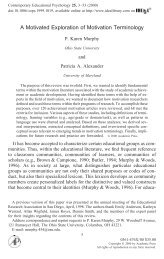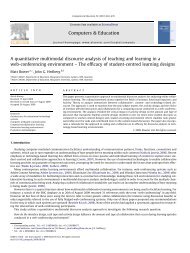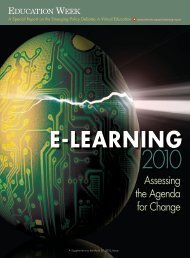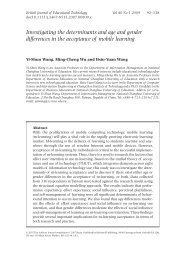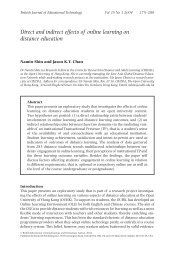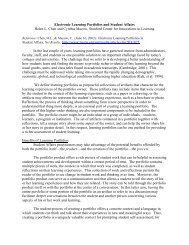Elements of Quality Online Education cation
Elements of Quality Online Education cation
Elements of Quality Online Education cation
Create successful ePaper yourself
Turn your PDF publications into a flip-book with our unique Google optimized e-Paper software.
Success Versus Value: What Do We Mean by the Business <strong>of</strong> <strong>Online</strong> <strong>Edu<strong>cation</strong></strong>?“Try not to be a man <strong>of</strong> success, but rather one <strong>of</strong> value” – A. EinsteinI. I. INTRODUCTIONGiven the diminishing resources <strong>of</strong> colleges and universities and the increasing complexity <strong>of</strong> thedemands placed on them, those <strong>of</strong> us who lead online programs and institutions are joining our face-t<strong>of</strong>acepeers in exploring how to make our schools more like businesses. However, the goal <strong>of</strong> edu<strong>cation</strong> asa business, at least as it is widely understood, is not the path to take. We need to understand, to paraphraseClark Kerr, what the uses <strong>of</strong> online learning are [1]. Therefore, before this paper begins to describe theskills that can make us better educators, I will put forth a sort <strong>of</strong> manifesto about the business <strong>of</strong>edu<strong>cation</strong>.We need first to define business and then explore whether a university meets the definition. MiltonFreidman argues that the primary responsibility <strong>of</strong> a business is to maximize its pr<strong>of</strong>its [2]. In contrast,Derek Bok outlines the social responsibilities <strong>of</strong> a modern university to make two points: “universities areconcerned with edu<strong>cation</strong>,” [3] and “like churches, universities experience the constant tensions thatresult from embracing transcendent goals and ideals while having to exist and be <strong>of</strong> service in a practical,imperfect world” [3]. Henry Hannsmann explores the rationale for exempting nonpr<strong>of</strong>it organizationsfrom corporate income tax on the basis <strong>of</strong> the public good [4]. Hank Levin has written about theinefficiencies <strong>of</strong> teaching and learning [5]. Although many have argued eloquently that Freidman’s notionis not a good fit for universities because we are different from businesses, yet we feel compelled to talkabout the “business” <strong>of</strong> online learning as if to justify our existence.At the 2003Association for Continuing Higher <strong>Edu<strong>cation</strong></strong> annual conference, the central focus <strong>of</strong> the townmeeting was the “attack” on adult edu<strong>cation</strong> [6]. Ortman notes that while nonpr<strong>of</strong>it colleges are closing,for-pr<strong>of</strong>it edu<strong>cation</strong> is on the rise [7]. Simultaneously, there is a rise in corporate universities [8], andmore recently we have learned that these entities are applying for accreditation and that fourteen canalready confer degrees [9]. Despite research from economists that consistently demonstrates the value <strong>of</strong>higher edu<strong>cation</strong>, we sense that non-pr<strong>of</strong>its are under the gun to justify our existence and the public’sallo<strong>cation</strong> <strong>of</strong> resources to our institutions.To paraphrase Langston Hughes, to prevent dreams from being deferred, we need to redefine who we areand what we mean. We are accountable to many more stakeholders than Friedman’s shareholders, and asBok notes, we serve many purposes, thus he uses the term multiversity [3]. The service a business <strong>of</strong>fersis a means to an end, which is pr<strong>of</strong>it. For higher edu<strong>cation</strong>, edu<strong>cation</strong> is seen as an end in itself. There arelogical reasons for having universities behave like universities rather than corporations.In higher edu<strong>cation</strong>, what we really mean when we refer to the value <strong>of</strong> business principles is more in linewith the notion <strong>of</strong> entrepreneurship, a notion more closely analogous with champion than with business.Because the public entrusts us with its resources and because we are concerned with providing the bestedu<strong>cation</strong> to the broadest number <strong>of</strong> people given the constraints both <strong>of</strong> our mission and our budgets, it istime for us to explore where we might apply some business principles in creative ways that help uschampion and maximize our mission rather than our pr<strong>of</strong>its.When using the business analogy, online educators should note that we have already solved the biggestissue faced by business: collectively, we have created a new way <strong>of</strong> learning, a new production function.That is the most valuable contribution we have made, and quality should continue to be our central focus.A wide body <strong>of</strong> literature exists that helps us think <strong>of</strong> learning in economic terms. Researchers such as184


